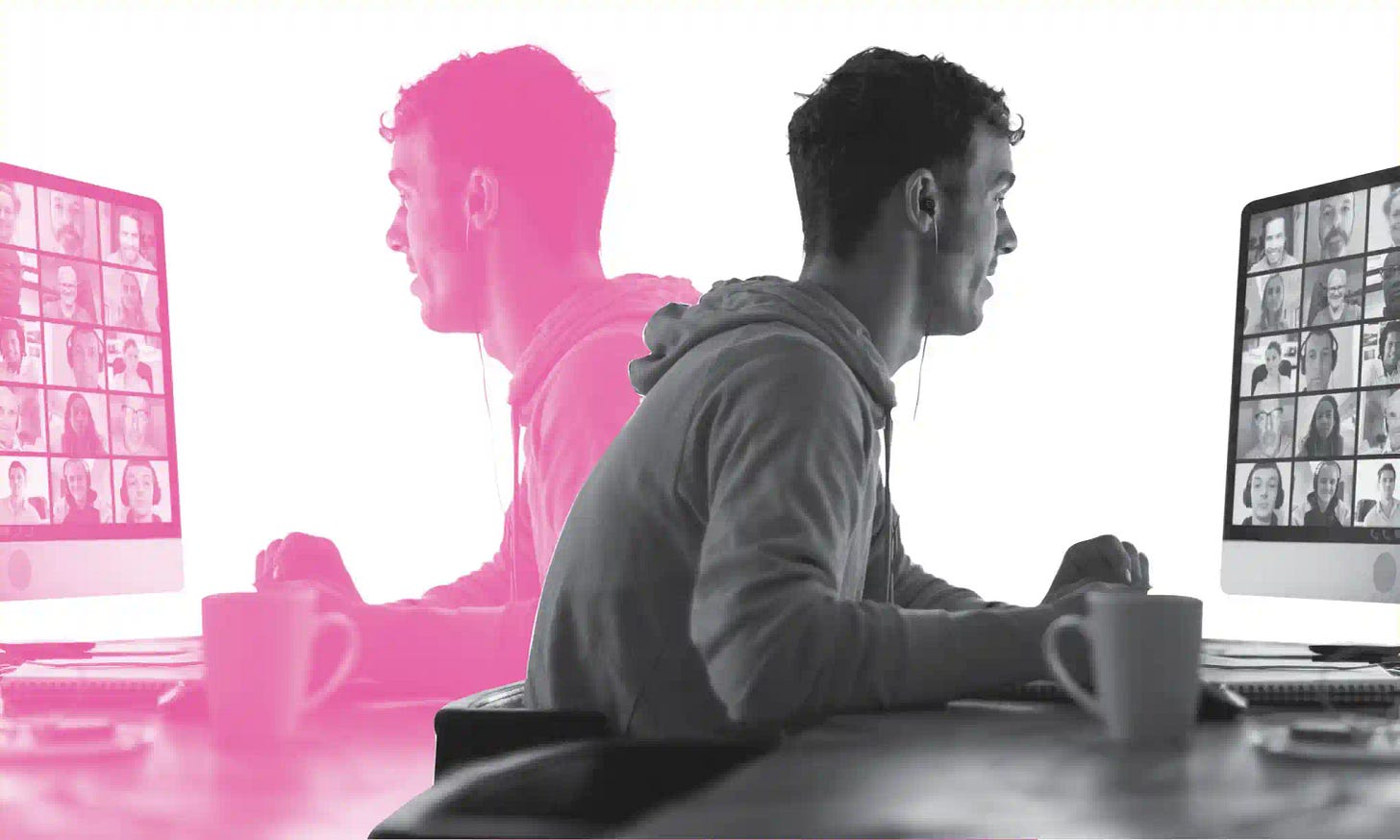Decision-making muscle, original metaverse, double work lives, gig mindset 2021
Exercise the decision-making muscle
It risks atrophy
In my recent podcast episode, I talked with Grégoire Charpe-Civatte, whom I’ve know for over 10 years. Key points we covered in our conversation:
Managers today often have atrophy of the decision-making muscle and rely on outside “experts” because it is reassuring.
We need more of a multi-disciplinary approach in our work.
Leadership is not about having expertise, market knowledge and so on. True leadership is being an orchestrator, able to point to the right direction.
A good leader makes time to think about leadership.
So-called agility and new ways of working are often a caricature, not productive.
Organizations need to slow down and take the time to make choices.
What I’m reading…
Snow Crash - the birth of the metaverse
I’m reading Snow Crash, from Neal Stephenson and loving it. He created the term “metaverse” in 1992. I’ll give you 3 examples of what happens in his metaverse and you tell me if they sound familiar. Remember, this is 30 years ago!
There has been a worldwide economic collapse and the federal government of the United States has delegated power and territory to private organizations.
Hyperinflation has led people to using encrypted electronic money.
Refugees from Asia come in waves across the Pacific in flimsy ships and hope to build a new life in North America.
Stephenson tweeted recently to clarify that he has nothing to do with, nor has communicated with Facebook:

‘It’s the biggest open secret out there’: the double lives of white-collar workers with two jobs
From The Guardian: Worth a quick read - this was news to me. Have you seen or done it already?
Remote working has made it easier than ever for staff to moonlight. But how do they cope with clashing meetings and two bosses? And can the rewards be worth the lies?
The Gig Mindset in 2021 - You and Your Organization
This report, just published, is a three-year perspective based on two gig-mindset surveys in 2018 and 2021. I’ve included occasional references to data from 2014 and 2016 for an even broader perspective. See the details when you download a copy of the report here from my website.
My key observations:
Good but not great
The 2021 data showed positive movement towards a more gig-mindset work culture, but no fundamental changes. Organizations are still mostly in traditional mode. The pandemic strengthened the gig mindset work culture – but not as dramatically as some people suggest.
The bottom-up movement that revealed the emergence of the gig mindset several years ago is still active. The top 25% of people already scoring high for gig-mindset behaviors did not evolve between 2018 and 2021. However, the bottom 25% became more gig-mindset in their behaviors. This is more important than the top evolving, because it signals change is continuing throughout organizations.
Slow progression towards putting people in charge of work
Organizations are inching towards liberating people to do their work as they see best by being more responsive and flexible, but 40% lean to inflexible and bureaucratic practices.
Individuals are showing willingness to experiment and “dare to do” more than before. However genuine, deeper individual freedoms such as challenging the status quo have not increased much.
Individuals reported the impact on the pandemic was that they felt more freedom, able to break the rules and accomplish more. However, in spite of doing more networking, they did not feel “more connected”.
Business-critical warnings becoming more significant in today’s difficult business environment
Senior management is a “serious concern holding us back” and has been for many years.
Organizations still prioritize customers over employees. Amazing but true. How can they hope to keep customers?!
See the details when you download a copy of the report here from my website.
From readers of my book…
Autonomy underlies self-care
“We know that self-management is essential, but Jane's research also shed light on the relationship between autonomy and self-care. ‘Even when people are working under stress, the more decision-making autonomy they have, the less likely they will suffer from burnout or have work-life balance problems.’ The book has such tidbits that make me stop, think, plan and act.”
Weak sides in my company I now understand
“Interesting that I could see some weak sides of our company before, but could not clearly put them together in words. And I found the explanations in your book.”
I retired from front line advising 3 years ago, and now focus on my research. I make much of that work available free of charge such as the report above. If you would like to support my research, consider buying a copy of my book. You will find it useful for your work, whether you are an independent worker or inside an organization.
Here are a few Amazon links: US - UK - Fr - India - Germany. Thank you.
See you in December. Have a good month.
If you have questions or comments, drop a note here or here.
If someone forwarded this to you, why don’t you sign up here and get future monthly Briefing Notes directly!





